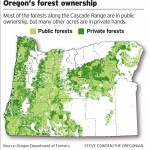A rising number of environmental groups now want to help the timber industry stay in business by providing funds or other support. The question is whether they can save timber companies and mills reeling from the collapse of housing and construction.
“It’s a new day — it’s a new landscape,” said Guido Rahr, president of the Wild Salmon Center in Portland. “We have to realize private-land timber companies are our friend. Once land gets broken up into smaller pieces, our ability to protect it is eliminated.”
Though some logging practices can harm fish, he said, the loss of forests altogether is much worse. That’s even more true as trees are increasingly counted on to soak up greenhouse gases that contribute to global warming.
Some land conservation groups such as Ecotrust, The Nature Conservancy, The Conservation Fund and Pacific Forest Trust have for years tried to protect prime forest by buying it or purchasing easements that limit development. But they cannot alone safeguard enough land.
“We do not at this point have the capital to be meaningful players,” said Lawrence Selzer, president of The Conservation Fund, which is based in Arlington, Va. He said the solution is to work with large forestland owners to help them profit from their forests so they do not sell the land off.
An estimated 1.5 million acres of forestland is lost in the United States each year, said Constance Best, co-founder of the Pacific Forest Trust. So far, Oregon has not seen as much loss as many other states. Trees grow so well in Oregon it often makes more financial sense to hold onto the land.
But as population grows and expands into rural areas, the real estate value of land may increasingly outweigh its value as forest.
Radical rethinking
Holding onto working forests is the single largest conservation challenge facing the country, Selzer said. But some environmental groups have focused so much on trying to block activities such as logging, he said, they have a hard time shifting their sights to support continued cutting.
“The environmental community has spent 40 years perfecting the art of saying no and has almost no ability to say yes,” Selzer said.
However, Doug Heiken of Oregon Wild does not see a high risk of forest sell-offs in Oregon, as long as land-use laws keep it under control. He said it’s more important to reform clear-cutting and road-building practices, and warned about promoting the business prospects of timber companies.
“I’m a bit hesitant to make forestry a highly profitable enterprise, because it means there’s going to be more logging,” he said.
The financial argument for maintaining private forests has steadily weakened for years, as wood that grows quickly in far-flung places like Brazil filled the world market and pushed timber prices down. That’s good for consumers, but not for forest owners hoping to profit from long-term forestry.
In pure dollar terms, with forests, “you’re almost always better off selling it versus holding it,” said Matthew Donegan, co-president of Forest Capital Partners, a Portland investment firm that owns and manages more than 2.5 million acres of forest around the country.
In Idaho, the company calculates that selling forest outright would bring in 6.5 times more money than holding and harvesting it over the long term. In western Oregon, the payoff is not as great — selling brings in only 1.5 times more than holding the land.
That’s because Oregon’s land use controls make real estate development less lucrative and because trees grow well on the wetter west side of the state, Donegan said. Forestland loss has been minimal in western Oregon.
The picture is different in northeast Oregon, though. Trees grow more slowly and sawmills have shut down, so it’s more difficult to make logging pay. There, selling forestland generates almost three times as much revenue as holding it over the long term.
View full article: Fall in wood products market redirects environmentalist strategy
Disclaimer: Articles featured on Oregon Report are the creation, responsibility and opinion of the authoring individual or organization which is featured at the top of every article.


